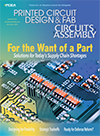Electrochemical Reliability Is the Focus of Session 4 at SMTA Europe's Harsh Environments
SMTA Europe
Electronics in Harsh Environments Conference
Amsterdam, Netherlands
April 24, 25 & 26, 2018
SMTA Europe announces Session 4 Technical Program on Electrochemical Reliability at the “Electronics in Harsh Environments Conference” to be held in Amsterdam, Netherlands, on April 25th, 2018.
There is mounting evidence that as PCB component density increases, so does the sensitivity of the circuit to ionic contamination. There have been many industry examples where manufacturers have relied on ionic contamination testers, yet still had product that failed in service.
Both OEMs and EMS companies need improved methods for developing “Objective Evidence” centered on the concept of a Qualified Manufacturing Process. To address this issue, Doug Pauls from Rockwell Collins will present an overview on Global Change in Ionic Cleanliness Requirements.
Removal of process residues is a common practice to reduce electrochemical interactions. The use of miniaturized components may violate minimum electrical clearance for devices exposed to harsh environments. Mike Konrad of Aqueous Technologies will present on cleanliness requirements needed to improve the reliability of printed circuit assemblies.
In highly humid environments, there is a greater concern on electronics robustness and signal integrity. Due to the need to reduce the power consumption of electronic modules, switching thresholds within high humidity environments decrease, which increases the propensity for leakage currents. Dr. Helmut Schweigart of Zestron, in collaboration with leading automotive tier 1 suppliers, will present research that allows an OEM to calculate switching threshold data on active devices that are exposed to harsh environments.







